
Problem Gambling Foundation. PGF creates resources to help create awareness of gambling harm in New Zealand. The Problem Gambling Foundation of New Zealand (PGF) is a national non-profit organisation predominantly funded by the Ministry of Health with funds received from the gambling levy. PGF is the largest single treatment provider for problem gambling in Australasia with over 60 locations throughout New Zealand and a staff of 58.
Internal AffairsThe Gambling (Problem Gambling Levy) Regulations 2019 have been confirmed by Cabinet.
The regulations will introduce new levy rates for the four levy-paying sectors and are planned to come into force on 1 July 2019. The newly confirmed levy rates (GST exclusive) are: gaming machine operators (0.78% of player expenditure); casinos (0.56% of player expenditure); NZ Lotteries Commission (0.43% of player expenditure); and New Zealand Racing Board (0.52% of player expenditure).
Decisions made on the new levy rates come after the Department of Internal Affairs and the Ministry of Health have consulted with the Gambling Commission, gambling operators, providers of services to prevent and minimise harmful gambling, and other affected groups.


The Regulatory Impact Assessment and the associated Cabinet paper will be proactively released on the Department of Internal Affairs and Ministry of Health’s website shortly.
The levy will be used to fund a national strategy and service delivery plan to prevent and minimise gambling harm.
11 July 2019
Gambits Survey - last chance
Thank you to those who have already taken the quick two minutes or so to complete the Gambits Survey.
We are looking forward to providing an overview of your feedback in the next issue of Gambits.
Getting to know the sector
Lisa Docherty, our new Director Gambling Regulatory System has spent some of her first month in the role meeting with a range of stakeholders in Auckland, Wellington and Christchurch. She has really appreciated hearing from the sector about the history of the system, their current challenges, and where they see the need for regulatory attention for the future.
Lisa says, 'A critical part of taking a system view is working with others to achieve better outcomes. Our stakeholders have been very generous with their time, and I look forward to working with them further on some challenging issues.'
In our next issue Lisa will say more about her priorities for the next 12 months.
Recognising Best Practice: Grassroots Trust three-year licence
Recently, we announced our first ever three-year Class 4 Gambling licence. Well done to Grassroots Trust in Hamilton for demonstrating a culture of care and minimising harm to their patrons.
We developed the three-year licence to identify and reward gambling operators, both club and non-club societies, who go beyond the legal minimum to achieve effective and efficient ways of minimising the harm associated with gambling, while also maximising the benefits to the community.
Grassroots has demonstrated this in their strong performance and best practice processes required to earn New Zealand’s first three-year licence.
You can find out more about the three-year licence on our website.
Strategy to Prevent and Minimise Gambling Harm Launched
The Ministry of Health [MoH] recently launched the Strategy to Prevent and Minimise Gambling Harm 2019-2022 .
Establishing a consumer network with people who've previously been harmed by gambling will be a key focus in the strategy.
Every three years the strategy is updated and this year, the Government has increased funding for the strategy by 5 million dollars.
The Ministry of Health is tasked with the funding and coordination of problem gambling services under the Gambling Act 2003, and assumed responsibility for this role on 1 July 2004.
The Department of Internal Affairs is New Zealand's primary gambling regulator and is responsible for administering the Gambling Act. We work to ensure New Zealanders can enjoy safe and fair gambling that efficiently and equitably contributes to community wellbeing.
“Gambling harm is a serious mental and public health issue that can have a devastating effect on the wellbeing of individuals and their whānau. The Gambling Act requires that we regularly review, consult on and refresh this strategy, but working with communities affected by gambling harm is also the best way to ensure that our strategy makes a difference,' says Richard Taylor, Manager Addictions, Ministry of Health.

New Zealand Problem Gambling Levy Payment
Mr Taylor says one thing we know is that Māori, Pacific and Asian populations are disproportionately impacted by gambling harm.
Problem Gambling Levy
The Gambling (Problem Gambling Levy) Regulations 2019 (the regulations) were published by the New Zealand Gazette on 20 June 2019, and they are now available on the New Zealand Legislation website. The regulations came into force on 1 July 2019.
Problem gambling services are funded through a levy on gambling operators. The levy is collected from the profits of New Zealand’s four main forms of gambling: gaming machines in pubs and clubs; casinos; the New Zealand Racing Board and the New Zealand Lotteries Commission.

What are the raffle rules?
A few weeks ago there was a media story around raffling a military tank. It was always going to grab the headlines and while it’s not illegal to run a raffle, many people don't realise that raffles and sweepstakes are classed as lottery games under the Gambling Act.
Below are some quick pointers but if in doubt, there is guidance for raffles on our website.
1.0Profits - Any profits made from a certain level of raffle must go back into the community to approved purposes.Raffles cannot be held for personal gain.
2.0Prize - The value of a prize makes a difference. A prize value may classify as Class 3 gambling and therefore, the raffle needs to be licensed and be run by an authorised society.
3.0 Under the Gambling Act an online raffle is classified as 'remote interactive gambling' and is also prohibited.
New Zealand Problem Gambling Levy Rate
Fact Sheet - Sales Promotion

Did you know that we have a number of gambling Fact Sheets published on our website?
We've just recently published an update on Sales Promotions.
Sales promotions are governed under the Gambling Act to ensure that businesses do not make any commercial gain from the sales promotion, other than through the normal trading of goods and services.
(SOURCE: The Department of Internal Affair, Gambits, 11 July 2019)
